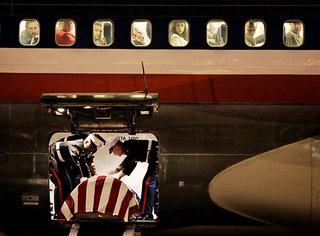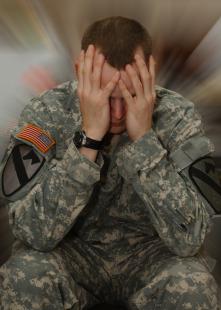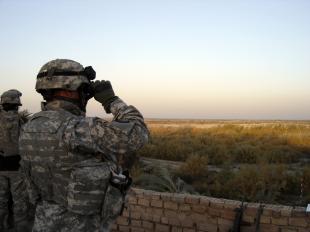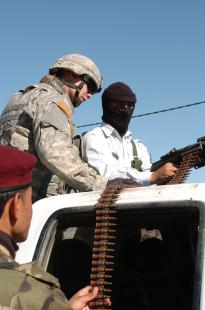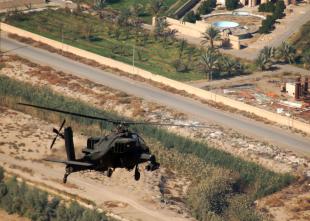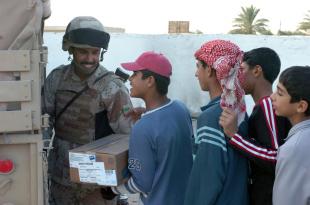30 December 2006
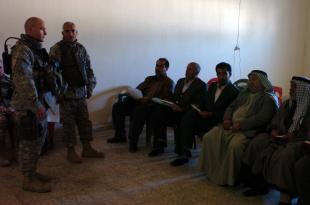
CPT Scott Nelson, commander for Company Apache, 1st Battalion, 501st Parachute Infantry Regiment, 4th Brigade Combat Team (Airborne), 25th Infantry Division listens to one of the council representatives as he explains what the people he represents needs during the first meeting of the Jurf as Sakhr City Council. This council meeting was held at an Iraqi police station in the town of Tahirr, Iraq. Pic: SGT Marcus Butler
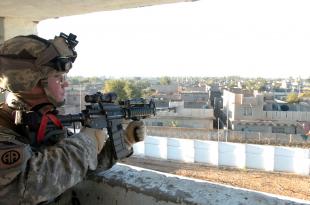
SSG Jason Boyle a native of Crestline, Calif., stares out over the town of Tahirr, Iraq providing security for the first meeting of the Jurf as Sakhr City Council. Boyle is assigned to the 1st Battalion, 501st Parachute Infantry Regiment, 4th Brigade Combat Team (Airborne), 25th Infantry Division. Pic: SGT Marcus Butler
28 December 2006
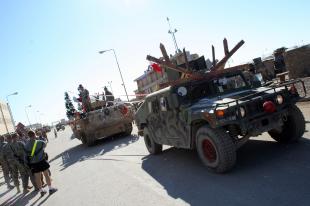
The Paratroopers of Company D, 1st “Geronimo” Battalion, 501st Parachute Infantry Regiment, 4th Brigade Combat Team (Airborne), 25th Infantry Division brightened up the holidays for their fellow Geronimos with their Christmas parade entry: a humvee with antlers in place of reindeer and an armored personnel carrier as a sleigh, connected by engineer tape for reins. The award-winning float earned three Company D troops well-deserved passes for some rest and relaxation in Qatar.
Pic: 1LT Tyler Mitchell
26 December 2006

From left to right: Despite a minor error in spelling, SGT Christopher Calahan, command drivers section leader for the 1st "Ironhorse" Brigade Combat Team and a native of Carbonhill, Ala., PFC Seth Cote, gunner for the Ironhorse Brigade's Personal Security Detachment and a native of Windham, Maine, and SPC Harrold Waterman, driver for the Ironhorse Brigade's command sergeant major and a native of Jackson Miss., took time to joke on Christmas Day creating an impromptu present out of one of the puppies on an observation post near Camp Taji, Iraq.
Pic: SGT Jon Cupp
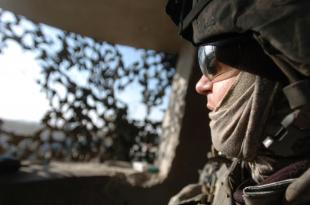
PFC Logan Gathman, tower guard, Company B, 2nd Battalion, 5th Cavalry Regiment, 1st Brigade Combat Team, 1st Cavalry Division, who is from Sacramento, Calif., looks out from his guard tower on Patrol Base Courage Dec. 25. Gathman surveyed the area for enemy activity Christmas to ensure the patrol base would not be attacked on the holiday.

SGT Shawn Holmes, a fire team leader with 2nd Battalion, 14th Infantry Regiment, 2nd Brigade Combat Team, 10th Mountain Division, who is from Pittsburgh, Pa., fixes the flex mount for the 50-caliber machine gun, which mounts to his vehicle Dec. 25. Holmes provides force protection to Patrol Base Gator Swamp and security to the surrounding area even on Christmas day.
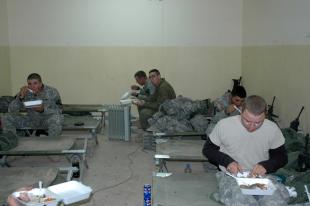
Soldiers from 2nd Battalion, 8th Cavalry Regiment's Bandog Company enjoy a hot Christmas meal at the Stallion Battalion patrol base in Mushahidah Dec. 25. Because the Soldiers were on mission and unable to go to the dining facility at Camp Taji, Iraq, their command brought nearly 100 meals to the Soldiers.
Pic: SGT Cheryl Cox
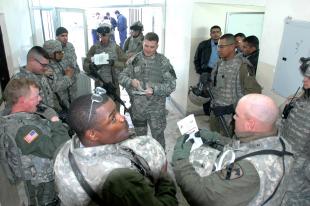
CPT Adrian Spevak (center), the Bandog Company, 2nd Battalion, 8th Cavalry Regiment commander, hands out Christmas cards Dec. 25 to his Soldiers who are away from Camp Taji, Iraq for Christmas. Since some of his Soldiers were unable to enjoy the festivities at Camp Taji, the command desided to take the Christmas festivities to the Soldiers at the Mushahidah patrol base. Along with the Christmas cards, the Soldiers were treated to a hot Christmas meal and gifts that had been sent to Camp Taji by the unit's Family Readiness Group.
PIC: SGT Cheryl Cox
22 December 2006
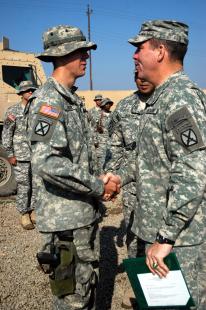
MG Benjamin C. Freakley (right), the 10th Mountain Division (LI) commanding general, shakes hands with PFC Travis Tysinger (left), a military policeman with the 2nd Brigade Special Troops Battalion, 2nd Brigade Combat Team, 10th Mtn. Div. (LI), and native of Zanesville, Ohio, at Camp Striker, Iraq. Freakley presented Tysinger with a Purple Heart Medal for wounds he sustained during a combat mission.
Pic: SSG Angela McKinzie
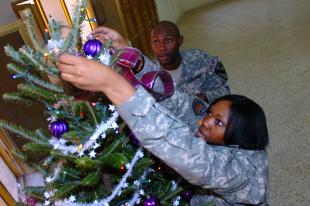
SGT Rosie Threatt, a native of Port Gibson, Miss., hangs a decoration on a tree donated by Jim and Beth Nickelson from Ludington, Mich., as SSG Jamile Dingle, from Charleston, S.C., looks on. Both are from Headquarters and Headquarters Company, 1st Air Cavalry Brigade, 1st Cavalry Division. Pic: SPC Nathan J. Hoskins
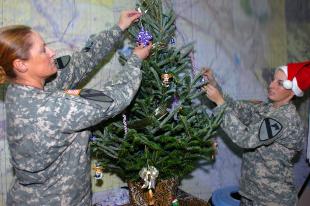
SGN Della St. Louis (left) from Ludington, Mich., and PFC Alisha Downey, a native of Wilson, Okla., decorate a Christmas tree donated by Jim and Beth Nickelson from Needlefast Evergreens in Ludington, Mich. Both Soldiers are from Headquarters and Headquarters Company, 1st Air Cavalry Brigade, 1st Cavalry Division. Pic: Nathan J. Hoskins
20 December 2006
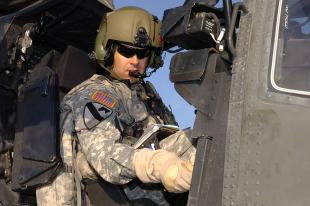
Inside an AH-64D Apache helicopter, CW4 Steven Kilgore, brigade master gunner, HHC, 1st ACB, 1st CD goes through a series pre-designated checks to ensure the bird is ready for flight. Once in the air, Kilgore fights the emergence of sectarian violence by providing security for ground forces and innocent Iraqi civilians.
Pic: SPC Nathan J. Hoskins
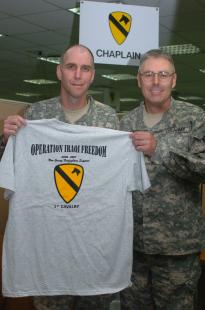
SFC Class Mark Morrissey (left), Provost Marshal Office (MPs) operations, and MAJ Robert Wichman, Chaplain, both with 1st Cavalry Division, Multi-National Division – Baghdad, hold up a T-shirt in the 1st Cav. Div. Chaplains Office at Camp Liberty, Iraq. The T-shirts were donated by the North Hudson Regional Fire & Rescue, New Jersey. Hoo-Ah!

LTG Ray Odierno, Commanding General, Multinational Corps – Iraq, awards SPC Jessica Schneider, Company D, Forward Support Company, 4th Squadron, 9th Cavalry Regiment, 2nd ‘Black Jack’ Brigade Combat Team, 1st Cavalry Division, a commander’s coin for her outstanding performance since she’s been in Iraq during a brief award ceremony on Forward Operating Base Prosperity.
Pic: SGT Curtis Cashour
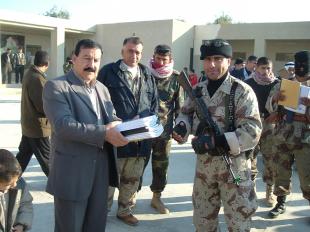
Members of the 5th Iraqi Army Division and Iraqi Government representatives from the Diyala province, pass out school supplies to local schools in Abu Sayda, which is located approximately 20 miles from Baqubah.
Pic: lLT Hector Guzman, Troop B, 6-9 Armored Reconnaissance Squadron, 3rd Brigade Combat Team, 1st Cavalry Division
19 December 2006
Last week, while traveling to Chicago on business, I noticed a Marine sergeant traveling with a folded flag, but did not put two and two together. After we boarded our flight, I turned to the sergeant, who'd been invited to sit in First Class (across from me), and inquired if he was heading home.
No, he responded.
Heading out I asked?
No. I'm escorting a soldier home.
Going to pick him up?
No. He is with me right now. He was killed in Iraq. I'm taking him home to his family.
The realization of what he had been asked to do hit me like a punch to the gut. It was an honor for him. He told me that, although he didn't know the soldier, he had delivered the news of his passing to the soldier's family and felt as if he knew them after many conversations in so few days. I turned back to him, extended my hand, and said, Thank you. Thank you for doing what you do so my family and I can do what we do.
Upon landing in Chicago the pilot stopped short of the gate and made the following announcement over the intercom.
"Ladies and gentlemen, I would like to note that we have had the honor of having Sergeant Steeley of the United States Marine Corps join us on this flight. He is escorting a fallen comrade back home to his family. I ask that you please remain in your seats when we open the forward door to allow Sergeant Steeley to deplane and receive his fellow soldier. We will then turn off the seat belt sign."
Without a sound, all went as requested. I noticed the sergeant saluting the casket as it was brought off the plane, and his action made me realize that I am proud to be an American.
So here's a public Thank You to our military Men and Women for what you do so we can live the way we do.
signed: Stuart Margel -- Washington, D.C.
Also, here are two very touching photos honored at this years International Picture of the Year.
No, he responded.
Heading out I asked?
No. I'm escorting a soldier home.
Going to pick him up?
No. He is with me right now. He was killed in Iraq. I'm taking him home to his family.
The realization of what he had been asked to do hit me like a punch to the gut. It was an honor for him. He told me that, although he didn't know the soldier, he had delivered the news of his passing to the soldier's family and felt as if he knew them after many conversations in so few days. I turned back to him, extended my hand, and said, Thank you. Thank you for doing what you do so my family and I can do what we do.
Upon landing in Chicago the pilot stopped short of the gate and made the following announcement over the intercom.
"Ladies and gentlemen, I would like to note that we have had the honor of having Sergeant Steeley of the United States Marine Corps join us on this flight. He is escorting a fallen comrade back home to his family. I ask that you please remain in your seats when we open the forward door to allow Sergeant Steeley to deplane and receive his fellow soldier. We will then turn off the seat belt sign."
Without a sound, all went as requested. I noticed the sergeant saluting the casket as it was brought off the plane, and his action made me realize that I am proud to be an American.
So here's a public Thank You to our military Men and Women for what you do so we can live the way we do.
signed: Stuart Margel -- Washington, D.C.
Also, here are two very touching photos honored at this years International Picture of the Year.
17 December 2006

The night before the burial of her husband's body, Katherine Cathey refused to leave the casket, asking to sleep next to his body for the last time. The Marines made a bed for her, tucking in the sheets below the flag. Before she fell asleep, she opened her laptop computer and played songs that reminded her of 'Cat,' and one of the Marines asked if she wanted them to continue standing watch as she slept. "I think it would be kind of nice if you kept doing it," she said. "I think that's what he would have wanted."
Pic: Mr. Todd Heisler

U.S. Army Paratrooper with Headquarter and Headquarters Company, 3rd Battalion, 509th Parachute Infantry Regiment, pulls security during a stop at an Iraqi Police Station in Haswah while on a presence patrol in Babil province. HHC 3/509th PIR, is conducting route reconnaissance and presence patrols in the area in order to engage the local populace and maintain their support of Coalition Forces.
Pic: SSG Sean A. Foley
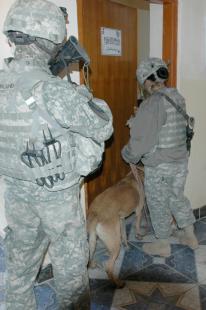
Petty Officer 1st Class Sasha Martinez, a Navy dog handler, guides her working dog, ‘Goof,’ into a room at the Qadaa Building in Tarmiyah to check for explosives prior to a Qadaa (council) meeting. The Qada meetings are held each Saturday in the Iraqi town north of Baghdad providing a forum for residents to discuss issues where the military can assist.
Pic: SGT Cheryl Cox

SSG Erik Decker, civil affairs noncommissioned officer, civil affairs noncommissioned officer, Civil Affairs Team A, from CA Team C, 489th CA Battalion, talks with an Iraqi Policeman near Camp Rustamiyah. The CA team was on a mission to meet with a local committee trying to improve its local government and improve local infrastructure.
Pic: SPC Leith Edgar
10 December 2006
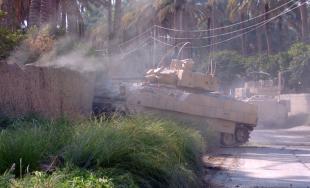
A Bradley fighting vehicle smashes through a wall in Muqdadiyah as part of a massive operation involving Iraqi Security Forces and Soldiers from the 6-9 Armored Reconnaissance Squadron, 3rd Brigade Combat Team, 1st Cavalry Division out of Fort Hood, Texas. The wall was used by insurgents as a place hide behind and lobb grenades to oncoming vehicles as well as hide vehicle borne improvised explosive devices.
Pic: SGT Armando L. Monroig
07 December 2006
Iraq Study Group
IRAQ STUDY GROUP REPORT
Some Highlights
Wednesday, December 06, 2006
ASSESSMENT
IRAQI ARMY
Significant questions remain about the ethnic composition
and loyalties of some Iraqi units—specifically, whether
they will carry out missions on behalf of national goals instead
of a sectarian agenda. Of Iraq’s 10 planned divisions, those that
are even-numbered are made up of Iraqis who signed up to
serve in a specific area, and they have been reluctant to redeploy
to other areas of the country. As a result, elements of the
Army have refused to carry out missions.
The Iraqi Army is also confronted by several other significant
challenges:
• Units lack leadership. They lack the ability to work together
and perform at higher levels of organization—the brigade and
division level. Leadership training and the experience of leadership
are the essential elements to improve performance.
Units lack equipment. They cannot carry out their missions
without adequate equipment. Congress has been generous
in funding requests for U.S. troops, but it has resisted fully
funding Iraqi forces. The entire appropriation for Iraqi defense
forces for FY 2006 ($3 billion) is less than the United States
currently
spends in Iraq every two weeks.
• Units lack personnel. Soldiers are on leave one week a
month so that they can visit their families and take them
their pay. Soldiers are paid in cash because there is no banking
system. Soldiers are given leave liberally and face no
penalties for absence without leave. Unit readiness rates are
low, often at 50 percent or less.
• Units lack logistics and support. They lack the ability to sustain
their operations, the capability to transport supplies and
troops, and the capacity to provide their own indirect fire
support, close-air support, technical intelligence, and medical
evacuation. They will depend on the United States for
logistics and support through at least 2007.
SECTARIAN LEADERSHIP
Moqtada al-Sadr:
Several observers remarked to us that Sadr was following
the model of Hezbollah in Lebanon: building a political
party that controls basic services within the government
and an armed militia outside of the government.
SECURITY
The security situation cannot improve unless leaders
act in support of national reconciliation. Shiite leaders must
make the decision to demobilize militias. Sunni Arabs must
make the decision to seek their aims through a peaceful political
process, not through violent revolt. The Iraqi government
and Sunni Arab tribes must aggressively pursue al Qaeda.
Militias are currently seen as legitimate vehicles of political
action. Shia political leaders make distinctions between the
Sunni insurgency (which seeks to overthrow the government)
and Shia militias (which are used to fight Sunnis, secure
neighborhoods,
and maximize power within the government). Though
Prime Minister Maliki has said he will address the problem of
militias, he has taken little meaningful action to curb their
influence.
He owes his office in large part to Sadr and has shown
little willingness to take on him or his Mahdi Army.
Sunni Arabs have not made the strategic decision to abandon
violent insurgency in favor of the political process. Sunni
Politicians within the government have a limited level of support
and influence among their own population, and questionable
influence over the insurgency. Insurgents wage a campaign of
intimidation against Sunni leaders—assassinating the family members
of those who do participate in the government. Too often,
insurgents tolerate and cooperate with al Qaeda, as they share a
mutual interest in attacking U.S. and Shia forces. However, Sunni
Arab tribal leaders in Anbar province recently took the positive
step of agreeing to pursue al Qaeda and foreign fighters in their
midst, and have started to take action on those commitments.
Sunni politicians told us that the U.S. military has to take
on the militias; Shia politicians told us that the U.S. military has
to help them take out the Sunni insurgents and al Qaeda. Each
side watches the other. Sunni insurgents will not lay down arms
unless the Shia militias are disarmed. Shia militias will not disarm
until the Sunni insurgency is destroyed. To put it simply:
there are many armed groups within Iraq, and very little will to
lay down arms.
Corruption is Rampant
One senior Iraqi official estimated that official corruption costs Iraq
$5–7 billion per year. Notable steps have been taken: Iraq has a
functioning audit board and inspectors general in the ministries, and
senior leaders including the Prime Minister have identified rooting out
corruption as a national priority. But too many political leaders
still pursue their personal, sectarian, or party interests. There
are still no examples of senior officials who have been brought
before a court of law and convicted on corruption charges.
In the oil sector, corruption is also debilitating. Experts estimate
that
150,000 to 200,000—and perhaps as many as 500,000—barrels
of oil per day are being stolen. Controlled prices for refined
products result in shortages within Iraq, which drive consumers
to the thriving black market. One senior U.S. official
told us that corruption is more responsible than insurgents for
breakdowns in the oil sector.
SUNNI FUNDING
Funding for the Sunni insurgency comes from private individuals
within Saudi Arabia and the Gulf States, even as those governments
help facilitate U.S. military operations in Iraq by providing basing
and
overflight rights and by cooperating on intelligence issues.
More Troops for Iraq
Sustained increases in U.S. troop levels would not solve the
fundamental cause of violence in Iraq, which is the absence of
national reconciliation. A senior American general told us that
adding U.S. troops might temporarily help limit violence in a
highly localized area. However, past experience indicates that
the violence would simply rekindle as soon as U.S. forces are
moved to another area. As another American general told us, if
the Iraqi government does not make political progress, “all the
troops in the world will not provide security.” Meanwhile,
America’s military capacity is stretched thin: we do not have the
troops or equipment to make a substantial, sustained increase
in our troop presence. Increased deployments to Iraq would also
necessarily hamper our ability to provide adequate resources
for our efforts in Afghanistan or respond to crises around the
world.
Devolution to Three Regions
The costs associated with devolving Iraq into three semiautonomous
regions with loose central control would be too high.
Because Iraq’s population is not neatly separated, regional
boundaries cannot be easily drawn. All eighteen Iraqi provinces
have mixed populations, as do Baghdad and most other major
cities in Iraq. A rapid devolution could result in mass population
movements, collapse of the Iraqi security forces, strengthening
of militias, ethnic cleansing, destabilization of neighboring
states, or attempts by neighboring states to dominate Iraqi regions.
RECOMMENDATION 22: The President should state that
the United States does not seek permanent military bases in
Iraq. If the Iraqi government were to request a temporary
base or bases, then the U.S. government could consider that
request as it would in the case of any other government.
SECURITY MILESTONES
(pending joint U.S.-Iraqi review)
By the end of 2006: Iraqi increase of 2007 security spending over 2006
levels
By April 2007: Iraqi control of the Army
By September 2007: Iraqi control of provinces
By December 2007: Iraqi security self-reliance (with U.S. support)
RECOMMENDATION 25: These milestones are a good
start. The United States should consult closely with the Iraqi
government and develop additional milestones in three
areas: national reconciliation, security, and improving government
services affecting the daily lives of Iraqis. As with
the current milestones, these additional milestones should be
tied to calendar dates to the fullest extent possible.
RECOMMENDATION 34: The question of the future U.S.
force presence must be on the table for discussion as the
national reconciliation dialogue takes place. Its inclusion will
increase the likelihood of participation by insurgents and
militia leaders, and thereby increase the possibilities for
success.
Security and Military Forces
A Military Strategy for Iraq
There is no action the American military can take that, by itself,
can bring about success in Iraq. But there are actions that the
U.S. and Iraqi governments, working together, can and should
take to increase the probability of avoiding disaster there, and
increase the chance of success.
The Iraqi government should accelerate the urgently
needed national reconciliation program to which it has already
committed. And it should accelerate assuming responsibility
for Iraqi security by increasing the number and quality of Iraqi
Army brigades. As the Iraqi Army increases in size and capability,
the Iraqi government should be able to take real responsibility
for governance.
While this process is under way, and to facilitate it, the
United States should significantly increase the number of U.S.
military personnel, including combat troops, imbedded in and
supporting Iraqi Army units. As these actions proceed, we could
begin to move combat forces out of Iraq. The primary mission of
U.S. forces in Iraq should evolve to one of supporting the Iraqi
army, which would take over primary responsibility for combat
operations. We should continue to maintain support forces,
rapid-reaction forces, special operations forces, intelligence
units, search-and-rescue units, and force protection units.
While the size and composition of the Iraqi Army is ultimately
a matter for the Iraqi government to determine, we
should be firm on the urgent near-term need for significant additional
trained Army brigades, since this is the key to Iraqis
taking over full responsibility for their own security, which they
want to do and which we need them to do. It is clear that they
will still need security assistance from the United States for
some time to come as they work to achieve political and security
changes.
One of the most important elements of our support
would be the imbedding of substantially more U.S. military
personnel in all Iraqi Army battalions and brigades, as well as
within Iraqi companies. U.S. personnel would provide advice,
combat assistance, and staff assistance. The training of Iraqi
units by the United States has improved and should continue
for the coming year. In addition to this training, Iraqi combat
units need supervised on-the-job training as they move to field
operations. This on-the-job training could be best done by
imbedding more U.S. military personnel in Iraqi deployed
units. The number of imbedded personnel would be based on
the recommendation of our military commanders in Iraq, but it
should be large enough to accelerate the development of a real
combat capability in Iraqi Army units. Such a mission could involve
10,000 to 20,000 American troops instead of the 3,000 to
4,000 now in this role. This increase in imbedded troops could
be carried out without an aggregate increase over time in the
total number of troops in Iraq by making a corresponding decrease
in troops assigned to U.S. combat brigades.
Another mission of the U.S. military would be to assist
Iraqi deployed brigades with intelligence, transportation, air
support, and logistics support, as well as providing some key
equipment.
A vital mission of the U.S. military would be to maintain
rapid-reaction teams and special operations teams. These
teams would be available to undertake strike missions against al
Qaeda in Iraq when the opportunity arises, as well as for o
The performance of the Iraqi Army could also be significantly
improved if it had improved equipment. One source
could be equipment left behind by departing U.S. units. The
quickest and most effective way for the Iraqi Army to get the
bulk of their equipment would be through our Foreign Military
Sales program, which they have already begun to use.
While these efforts are building up, and as additional
Iraqi brigades are being deployed, U.S. combat brigades could
begin to move out of Iraq. By the first quarter of 2008, subject
to unexpected developments in the security situation on the
ground, all combat brigades not necessary for force protection
could be out of Iraq. At that time, U.S. combat forces in Iraq
could be deployed only in units embedded with Iraqi forces, in
rapid-reaction and special operations teams, and in training,
equipping, advising, force protection, and search and rescue.
Intelligence and support efforts would continue. Even after the
United States has moved all combat brigades out of Iraq, we
would maintain a considerable military presence in the region,
with our still significant force in Iraq and with our powerful air,
ground, and naval deployments in Kuwait, Bahrain, and Qatar,
as well as an increased presence in Afghanistan. These forces
would be sufficiently robust to permit the United States, working
with the Iraqi government, to accomplish four missions:
• Provide political reassurance to the Iraqi government in order
to avoid its collapse and the disintegration of the country.
• Fight al Qaeda and other terrorist organizations in Iraq
using special operations teams.
• Train, equip, and support the Iraqi security forces.
• Deter even more destructive interference in Iraq by Syria
and Iran.
Because of the importance of Iraq to our regional security
goals and to our ongoing fight against al Qaeda, we considered
proposals to make a substantial increase (100,000 to 200,000)
in the number of U.S. troops in Iraq. We rejected this course
because we do not believe that the needed levels are available
for a sustained deployment. Further, adding more American
troops could conceivably worsen those aspects of the security
problem that are fed by the view that the U.S. presence is intended
to be a long-term “occupation.” We could, however,
support a short-term redeployment or surge of American combat
forces to stabilize Baghdad, or to speed up the training and
equipping mission, if the U.S. commander in Iraq determines
that such steps would be effective.
We also rejected the immediate withdrawal of our troops,
because we believe that so much is at stake.
We believe that our recommended actions will give the
Iraqi Army the support it needs to have a reasonable chance to
take responsibility for Iraq’s security. Given the ongoing
deterioration
in the security situation, it is urgent to move as quickly
as possible to have that security role taken over by Iraqi security
forces.
The United States should not make an open-ended commitment
to keep large numbers of American troops deployed
in Iraq for three compelling reasons.
First, and most importantly, the United States faces other
security dangers in the world, and a continuing Iraqi commitment
of American ground forces at present levels will leave no
reserve available to meet other contingencies.
RECOMMENDATION 40: The United States should not
make an open-ended commitment to keep large numbers of
American troops deployed in Iraq.
RECOMMENDATION 41: The United States must make it
clear to the Iraqi government that the United States could
carry out its plans, including planned redeployments, even if
Iraq does not implement its planned changes. America’s
other security needs and the future of our military cannot be
made hostage to the actions or inactions of the Iraqi government.
RECOMMENDATION 42: We should seek to complete the
training and equipping mission by the first quarter of 2008,
as stated by General George Casey on October 24, 2006.
RECOMMENDATION 43: Military priorities in Iraq must
change, with the highest priority given to the training, equipping,
advising, and support mission and to counterterrorism
operations.
RECOMMENDATION 44: The most highly qualified U.S. officers
and military personnel should be assigned to the
imbedded teams, and American teams should be present with
Iraqi units down to the company level. The U.S. military
should establish suitable career-enhancing incentives for
these officers and personnel.
RECOMMENDATION 45: The United States should support
more and better equipment for the Iraqi Army by encouraging
the Iraqi government to accelerate its Foreign
Military Sales requests and, as American combat brigades
move out of Iraq, by leaving behind some American equipment
for Iraqi forces.
Restoring the U.S. Military
RECOMMENDATION 46: The new Secretary of Defense
should make every effort to build healthy civil-military relations,
by creating an environment in which the senior military
feel free to offer independent advice not only to the
civilian leadership in the Pentagon but also to the President
and the National Security Council, as envisioned in the Goldwater-
Nichols legislation.
RECOMMENDATION 47: As redeployment proceeds, the
Pentagon leadership should emphasize training and education
programs for the forces that have returned to the continental United States in order to “reset” the force and restore
the U.S. military to a high level of readiness for global
contingencies.
RECOMMENDATION 48: As equipment returns to the
United States, Congress should appropriate sufficient funds
to restore the equipment to full functionality over the next
five years.
RECOMMENDATION 49: The administration, in full consultation
with the relevant committees of Congress, should
assess the full future budgetary impact of the war in Iraq and
its potential impact on the future readiness of the force, the
ability to recruit and retain high-quality personnel, needed
investments in procurement and in research and development,
and the budgets of other U.S. government agencies involved
in the stability and reconstruction effort.
Budget Preparation, Presentation, and Review
RECOMMENDATION 72: Costs for the war in Iraq should
be included in the President’s annual budget request, starting
in FY 2008: the war is in its fourth year, and the normal
budget process should not be circumvented. Funding requests
for the war in Iraq should be presented clearly to
Congress and the American people. Congress must carry out
its constitutional responsibility to review budget requests for
the war in Iraq carefully and to conduct oversight.
Finding: This is a non-starter. OMB tried to get the MilDepts to
include
the war costs in their FY08 budget requests. The result was the Army
didn't submit the POM 08 until last Monday – three months late. The
Army
asked for $25 B addition to the 08 budget, only got $7 B relief from
OMB. OMB gave up and the MilDepts requested a $150 B Second FY07
Supplemental.
RECOMMENDATION 75: For the longer term, the United States government needs to improve how its constituent
agencies—Defense, State, Agency for International Development,
Treasury, Justice, the intelligence community, and others—
respond to a complex stability operation like that
represented by this decade’s Iraq and Afghanistan wars and
the previous decade’s operations in the Balkans. They need to
train for, and conduct, joint operations across agency boundaries,
following the Goldwater-Nichols model that has
proved so successful in the U.S. armed services.
We were told that there are fewer than 10 analysts on the
job at the Defense Intelligence Agency who have more than two
years’ experience in analyzing the insurgency.
Our embassy of 1,000 has 33 Arabic speakers, just six
of whom are at the level of fluency.
RECOMMENDATION 77: The Director of National Intelligence
and the Secretary of Defense should devote significantly
greater analytic resources to the task of understanding
the threats and sources of violence in Iraq.
FAIR USE
In accordance with Title 17 Section 107, this material
is distributed without profit or payment to those who have expressed a
prior interest in receiving this information for non-profit research
and
educational purposes only.
SIGNATURE BLOCK
Ted Cormaney
Consultant
Mount St. Albans
Washington, DC
202-966-8801
Some Highlights
Wednesday, December 06, 2006
ASSESSMENT
IRAQI ARMY
Significant questions remain about the ethnic composition
and loyalties of some Iraqi units—specifically, whether
they will carry out missions on behalf of national goals instead
of a sectarian agenda. Of Iraq’s 10 planned divisions, those that
are even-numbered are made up of Iraqis who signed up to
serve in a specific area, and they have been reluctant to redeploy
to other areas of the country. As a result, elements of the
Army have refused to carry out missions.
The Iraqi Army is also confronted by several other significant
challenges:
• Units lack leadership. They lack the ability to work together
and perform at higher levels of organization—the brigade and
division level. Leadership training and the experience of leadership
are the essential elements to improve performance.
Units lack equipment. They cannot carry out their missions
without adequate equipment. Congress has been generous
in funding requests for U.S. troops, but it has resisted fully
funding Iraqi forces. The entire appropriation for Iraqi defense
forces for FY 2006 ($3 billion) is less than the United States
currently
spends in Iraq every two weeks.
• Units lack personnel. Soldiers are on leave one week a
month so that they can visit their families and take them
their pay. Soldiers are paid in cash because there is no banking
system. Soldiers are given leave liberally and face no
penalties for absence without leave. Unit readiness rates are
low, often at 50 percent or less.
• Units lack logistics and support. They lack the ability to sustain
their operations, the capability to transport supplies and
troops, and the capacity to provide their own indirect fire
support, close-air support, technical intelligence, and medical
evacuation. They will depend on the United States for
logistics and support through at least 2007.
SECTARIAN LEADERSHIP
Moqtada al-Sadr:
Several observers remarked to us that Sadr was following
the model of Hezbollah in Lebanon: building a political
party that controls basic services within the government
and an armed militia outside of the government.
SECURITY
The security situation cannot improve unless leaders
act in support of national reconciliation. Shiite leaders must
make the decision to demobilize militias. Sunni Arabs must
make the decision to seek their aims through a peaceful political
process, not through violent revolt. The Iraqi government
and Sunni Arab tribes must aggressively pursue al Qaeda.
Militias are currently seen as legitimate vehicles of political
action. Shia political leaders make distinctions between the
Sunni insurgency (which seeks to overthrow the government)
and Shia militias (which are used to fight Sunnis, secure
neighborhoods,
and maximize power within the government). Though
Prime Minister Maliki has said he will address the problem of
militias, he has taken little meaningful action to curb their
influence.
He owes his office in large part to Sadr and has shown
little willingness to take on him or his Mahdi Army.
Sunni Arabs have not made the strategic decision to abandon
violent insurgency in favor of the political process. Sunni
Politicians within the government have a limited level of support
and influence among their own population, and questionable
influence over the insurgency. Insurgents wage a campaign of
intimidation against Sunni leaders—assassinating the family members
of those who do participate in the government. Too often,
insurgents tolerate and cooperate with al Qaeda, as they share a
mutual interest in attacking U.S. and Shia forces. However, Sunni
Arab tribal leaders in Anbar province recently took the positive
step of agreeing to pursue al Qaeda and foreign fighters in their
midst, and have started to take action on those commitments.
Sunni politicians told us that the U.S. military has to take
on the militias; Shia politicians told us that the U.S. military has
to help them take out the Sunni insurgents and al Qaeda. Each
side watches the other. Sunni insurgents will not lay down arms
unless the Shia militias are disarmed. Shia militias will not disarm
until the Sunni insurgency is destroyed. To put it simply:
there are many armed groups within Iraq, and very little will to
lay down arms.
Corruption is Rampant
One senior Iraqi official estimated that official corruption costs Iraq
$5–7 billion per year. Notable steps have been taken: Iraq has a
functioning audit board and inspectors general in the ministries, and
senior leaders including the Prime Minister have identified rooting out
corruption as a national priority. But too many political leaders
still pursue their personal, sectarian, or party interests. There
are still no examples of senior officials who have been brought
before a court of law and convicted on corruption charges.
In the oil sector, corruption is also debilitating. Experts estimate
that
150,000 to 200,000—and perhaps as many as 500,000—barrels
of oil per day are being stolen. Controlled prices for refined
products result in shortages within Iraq, which drive consumers
to the thriving black market. One senior U.S. official
told us that corruption is more responsible than insurgents for
breakdowns in the oil sector.
SUNNI FUNDING
Funding for the Sunni insurgency comes from private individuals
within Saudi Arabia and the Gulf States, even as those governments
help facilitate U.S. military operations in Iraq by providing basing
and
overflight rights and by cooperating on intelligence issues.
More Troops for Iraq
Sustained increases in U.S. troop levels would not solve the
fundamental cause of violence in Iraq, which is the absence of
national reconciliation. A senior American general told us that
adding U.S. troops might temporarily help limit violence in a
highly localized area. However, past experience indicates that
the violence would simply rekindle as soon as U.S. forces are
moved to another area. As another American general told us, if
the Iraqi government does not make political progress, “all the
troops in the world will not provide security.” Meanwhile,
America’s military capacity is stretched thin: we do not have the
troops or equipment to make a substantial, sustained increase
in our troop presence. Increased deployments to Iraq would also
necessarily hamper our ability to provide adequate resources
for our efforts in Afghanistan or respond to crises around the
world.
Devolution to Three Regions
The costs associated with devolving Iraq into three semiautonomous
regions with loose central control would be too high.
Because Iraq’s population is not neatly separated, regional
boundaries cannot be easily drawn. All eighteen Iraqi provinces
have mixed populations, as do Baghdad and most other major
cities in Iraq. A rapid devolution could result in mass population
movements, collapse of the Iraqi security forces, strengthening
of militias, ethnic cleansing, destabilization of neighboring
states, or attempts by neighboring states to dominate Iraqi regions.
RECOMMENDATION 22: The President should state that
the United States does not seek permanent military bases in
Iraq. If the Iraqi government were to request a temporary
base or bases, then the U.S. government could consider that
request as it would in the case of any other government.
SECURITY MILESTONES
(pending joint U.S.-Iraqi review)
By the end of 2006: Iraqi increase of 2007 security spending over 2006
levels
By April 2007: Iraqi control of the Army
By September 2007: Iraqi control of provinces
By December 2007: Iraqi security self-reliance (with U.S. support)
RECOMMENDATION 25: These milestones are a good
start. The United States should consult closely with the Iraqi
government and develop additional milestones in three
areas: national reconciliation, security, and improving government
services affecting the daily lives of Iraqis. As with
the current milestones, these additional milestones should be
tied to calendar dates to the fullest extent possible.
RECOMMENDATION 34: The question of the future U.S.
force presence must be on the table for discussion as the
national reconciliation dialogue takes place. Its inclusion will
increase the likelihood of participation by insurgents and
militia leaders, and thereby increase the possibilities for
success.
Security and Military Forces
A Military Strategy for Iraq
There is no action the American military can take that, by itself,
can bring about success in Iraq. But there are actions that the
U.S. and Iraqi governments, working together, can and should
take to increase the probability of avoiding disaster there, and
increase the chance of success.
The Iraqi government should accelerate the urgently
needed national reconciliation program to which it has already
committed. And it should accelerate assuming responsibility
for Iraqi security by increasing the number and quality of Iraqi
Army brigades. As the Iraqi Army increases in size and capability,
the Iraqi government should be able to take real responsibility
for governance.
While this process is under way, and to facilitate it, the
United States should significantly increase the number of U.S.
military personnel, including combat troops, imbedded in and
supporting Iraqi Army units. As these actions proceed, we could
begin to move combat forces out of Iraq. The primary mission of
U.S. forces in Iraq should evolve to one of supporting the Iraqi
army, which would take over primary responsibility for combat
operations. We should continue to maintain support forces,
rapid-reaction forces, special operations forces, intelligence
units, search-and-rescue units, and force protection units.
While the size and composition of the Iraqi Army is ultimately
a matter for the Iraqi government to determine, we
should be firm on the urgent near-term need for significant additional
trained Army brigades, since this is the key to Iraqis
taking over full responsibility for their own security, which they
want to do and which we need them to do. It is clear that they
will still need security assistance from the United States for
some time to come as they work to achieve political and security
changes.
One of the most important elements of our support
would be the imbedding of substantially more U.S. military
personnel in all Iraqi Army battalions and brigades, as well as
within Iraqi companies. U.S. personnel would provide advice,
combat assistance, and staff assistance. The training of Iraqi
units by the United States has improved and should continue
for the coming year. In addition to this training, Iraqi combat
units need supervised on-the-job training as they move to field
operations. This on-the-job training could be best done by
imbedding more U.S. military personnel in Iraqi deployed
units. The number of imbedded personnel would be based on
the recommendation of our military commanders in Iraq, but it
should be large enough to accelerate the development of a real
combat capability in Iraqi Army units. Such a mission could involve
10,000 to 20,000 American troops instead of the 3,000 to
4,000 now in this role. This increase in imbedded troops could
be carried out without an aggregate increase over time in the
total number of troops in Iraq by making a corresponding decrease
in troops assigned to U.S. combat brigades.
Another mission of the U.S. military would be to assist
Iraqi deployed brigades with intelligence, transportation, air
support, and logistics support, as well as providing some key
equipment.
A vital mission of the U.S. military would be to maintain
rapid-reaction teams and special operations teams. These
teams would be available to undertake strike missions against al
Qaeda in Iraq when the opportunity arises, as well as for o
The performance of the Iraqi Army could also be significantly
improved if it had improved equipment. One source
could be equipment left behind by departing U.S. units. The
quickest and most effective way for the Iraqi Army to get the
bulk of their equipment would be through our Foreign Military
Sales program, which they have already begun to use.
While these efforts are building up, and as additional
Iraqi brigades are being deployed, U.S. combat brigades could
begin to move out of Iraq. By the first quarter of 2008, subject
to unexpected developments in the security situation on the
ground, all combat brigades not necessary for force protection
could be out of Iraq. At that time, U.S. combat forces in Iraq
could be deployed only in units embedded with Iraqi forces, in
rapid-reaction and special operations teams, and in training,
equipping, advising, force protection, and search and rescue.
Intelligence and support efforts would continue. Even after the
United States has moved all combat brigades out of Iraq, we
would maintain a considerable military presence in the region,
with our still significant force in Iraq and with our powerful air,
ground, and naval deployments in Kuwait, Bahrain, and Qatar,
as well as an increased presence in Afghanistan. These forces
would be sufficiently robust to permit the United States, working
with the Iraqi government, to accomplish four missions:
• Provide political reassurance to the Iraqi government in order
to avoid its collapse and the disintegration of the country.
• Fight al Qaeda and other terrorist organizations in Iraq
using special operations teams.
• Train, equip, and support the Iraqi security forces.
• Deter even more destructive interference in Iraq by Syria
and Iran.
Because of the importance of Iraq to our regional security
goals and to our ongoing fight against al Qaeda, we considered
proposals to make a substantial increase (100,000 to 200,000)
in the number of U.S. troops in Iraq. We rejected this course
because we do not believe that the needed levels are available
for a sustained deployment. Further, adding more American
troops could conceivably worsen those aspects of the security
problem that are fed by the view that the U.S. presence is intended
to be a long-term “occupation.” We could, however,
support a short-term redeployment or surge of American combat
forces to stabilize Baghdad, or to speed up the training and
equipping mission, if the U.S. commander in Iraq determines
that such steps would be effective.
We also rejected the immediate withdrawal of our troops,
because we believe that so much is at stake.
We believe that our recommended actions will give the
Iraqi Army the support it needs to have a reasonable chance to
take responsibility for Iraq’s security. Given the ongoing
deterioration
in the security situation, it is urgent to move as quickly
as possible to have that security role taken over by Iraqi security
forces.
The United States should not make an open-ended commitment
to keep large numbers of American troops deployed
in Iraq for three compelling reasons.
First, and most importantly, the United States faces other
security dangers in the world, and a continuing Iraqi commitment
of American ground forces at present levels will leave no
reserve available to meet other contingencies.
RECOMMENDATION 40: The United States should not
make an open-ended commitment to keep large numbers of
American troops deployed in Iraq.
RECOMMENDATION 41: The United States must make it
clear to the Iraqi government that the United States could
carry out its plans, including planned redeployments, even if
Iraq does not implement its planned changes. America’s
other security needs and the future of our military cannot be
made hostage to the actions or inactions of the Iraqi government.
RECOMMENDATION 42: We should seek to complete the
training and equipping mission by the first quarter of 2008,
as stated by General George Casey on October 24, 2006.
RECOMMENDATION 43: Military priorities in Iraq must
change, with the highest priority given to the training, equipping,
advising, and support mission and to counterterrorism
operations.
RECOMMENDATION 44: The most highly qualified U.S. officers
and military personnel should be assigned to the
imbedded teams, and American teams should be present with
Iraqi units down to the company level. The U.S. military
should establish suitable career-enhancing incentives for
these officers and personnel.
RECOMMENDATION 45: The United States should support
more and better equipment for the Iraqi Army by encouraging
the Iraqi government to accelerate its Foreign
Military Sales requests and, as American combat brigades
move out of Iraq, by leaving behind some American equipment
for Iraqi forces.
Restoring the U.S. Military
RECOMMENDATION 46: The new Secretary of Defense
should make every effort to build healthy civil-military relations,
by creating an environment in which the senior military
feel free to offer independent advice not only to the
civilian leadership in the Pentagon but also to the President
and the National Security Council, as envisioned in the Goldwater-
Nichols legislation.
RECOMMENDATION 47: As redeployment proceeds, the
Pentagon leadership should emphasize training and education
programs for the forces that have returned to the continental United States in order to “reset” the force and restore
the U.S. military to a high level of readiness for global
contingencies.
RECOMMENDATION 48: As equipment returns to the
United States, Congress should appropriate sufficient funds
to restore the equipment to full functionality over the next
five years.
RECOMMENDATION 49: The administration, in full consultation
with the relevant committees of Congress, should
assess the full future budgetary impact of the war in Iraq and
its potential impact on the future readiness of the force, the
ability to recruit and retain high-quality personnel, needed
investments in procurement and in research and development,
and the budgets of other U.S. government agencies involved
in the stability and reconstruction effort.
Budget Preparation, Presentation, and Review
RECOMMENDATION 72: Costs for the war in Iraq should
be included in the President’s annual budget request, starting
in FY 2008: the war is in its fourth year, and the normal
budget process should not be circumvented. Funding requests
for the war in Iraq should be presented clearly to
Congress and the American people. Congress must carry out
its constitutional responsibility to review budget requests for
the war in Iraq carefully and to conduct oversight.
Finding: This is a non-starter. OMB tried to get the MilDepts to
include
the war costs in their FY08 budget requests. The result was the Army
didn't submit the POM 08 until last Monday – three months late. The
Army
asked for $25 B addition to the 08 budget, only got $7 B relief from
OMB. OMB gave up and the MilDepts requested a $150 B Second FY07
Supplemental.
RECOMMENDATION 75: For the longer term, the United States government needs to improve how its constituent
agencies—Defense, State, Agency for International Development,
Treasury, Justice, the intelligence community, and others—
respond to a complex stability operation like that
represented by this decade’s Iraq and Afghanistan wars and
the previous decade’s operations in the Balkans. They need to
train for, and conduct, joint operations across agency boundaries,
following the Goldwater-Nichols model that has
proved so successful in the U.S. armed services.
We were told that there are fewer than 10 analysts on the
job at the Defense Intelligence Agency who have more than two
years’ experience in analyzing the insurgency.
Our embassy of 1,000 has 33 Arabic speakers, just six
of whom are at the level of fluency.
RECOMMENDATION 77: The Director of National Intelligence
and the Secretary of Defense should devote significantly
greater analytic resources to the task of understanding
the threats and sources of violence in Iraq.
FAIR USE
In accordance with Title 17 Section 107, this material
is distributed without profit or payment to those who have expressed a
prior interest in receiving this information for non-profit research
and
educational purposes only.
SIGNATURE BLOCK
Ted Cormaney
Consultant
Mount St. Albans
Washington, DC
202-966-8801

Commanders Susan P. McKeefrey, 50 from Rhinebeck, N.Y. and a nurse with TQ Surgical and Pamela C. Harvey, 39 from Muscatine, Iowa and a doctor with TQ Surgical got to see Riyam Shihan again during an arranged meeting in Habbaniyah. Riyam's cousin was trying to close a heavy, metal door, at a home in Habbaniyah when it became unhinged and fell on Riyam, crushing her skull. When she arrived at TQ Surgical, her condition deteriorated quickly. Fearing the worst, doctors and corpsmen "launched into action," said Lt. Cmdr. Pamela C. Harvey, 39 from Muscatine, Iowa and a doctor with TQ Surgical, 1st Marine Logistics Group (Forward). In the early hours of October 14th, an unconscious Riyam Shihan was flown to a higher level hospital. TQ Surgical's staff doubted she would survive the required surgery, much less walk and talk again. So when Riyam walked back into the hospital a month later and asked for strawberry bubble gum, surgeons and corpsmen were amazed. "I couldn't believe it," said Cmdr. Tracy R. Bilski, a trauma surgeon for TQ Surgical. Upon seeing the girl's outcome, Bilski, 38 from Bellmawr, N.J. burst into tears of shock and joy. "(The sheik) is in charge of six thousand people, and all of them know this story, and soon all of their friends will know this story," said Hameed. Riyam's grandfather has also informed many other sheiks, who will probably inform their people, he added. "Saving this girl's life," said Hameed, "was like saving all of Iraq." The PTT teams and Surgical Unit are deployed in support of Operation Iraqi Freedom in the Al Anbar Province of Iraq (MNF-W) to develop the Iraqi Security Forces, facilitate the development of official rule of law through democratic government reforms, and continue the development of a market based economy centered on Iraqi Reconstruction.
Pic: CPL Geoffrey Ingersoll
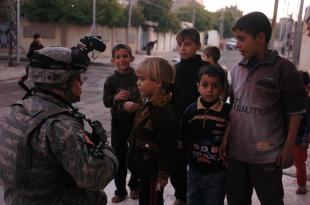
An Iraqi girl approaches Staff Sgt. Michael Marker for a conversation in the Mosul neighborhood of Hay-Al-Tenek. Marker, a squad leader with 2nd Platoon, Company B, 5th Battalion, 20th Infantry Regiment, 3rd Stryker Brigade Combat Team, 2nd Infantry Division, and other Soldiers from 5-20 Inf. Reg. joined Iraqi Army soldiers with 1st Battalion, 2nd Brigade, 2nd Iraqi Army Division in a joint presence and community engagement patrol in Hay-Al-Tenek
06 December 2006
03 December 2006
Brother & Sister Reunited
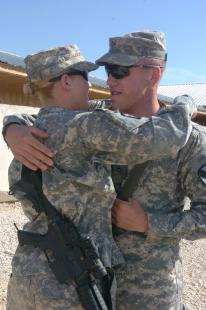
PFC Harold Rust, with Headquarters and Headquarters Company, Division Special Troops Battalion, 1st Cavalry Division and SGT Jessie Rust, Company A, 725th Battalion, 4th Brigade, 25th Infantry Division (Airborne), siblings from Helena, Mont., embrace in a holiday hug after reuniting at Camp Kalsu.
Pic: PFC Shea Butler

Lance Cpl. Ryan L. Tomlinson (left) reunites with his brother, Cpl. Erik W. Tomlinson, a 21-year-old squad leader with 2nd Platoon, Company L, 3rd Battalion, 2nd Marine Regiment, 1st Marine Division, at Camp Taqaddum.. The brothers had seen one another only two times in more than two years. Ryan, a 19-year-old combat correspondent with 1st Marine Logistics Group (Forward), had this to say about seeing his older brother: "It was just perfect. I can't really explain how good I feel right now." Both are from Franklin, Tenn., and expected to return to the states in February 2007. 1st Marine Logistics Group is deployed with I MEF (FWD) in support of Operation Iraqi Freedom in the Al Anbar Province of Iraq (MNF-W) to develop the Iraqi Security Forces, facilitate the development of official rule of law through democratic government reforms, and continue the development of a market based economy centered on Iraqi Reconstruction.
02 December 2006
Have You Ever Eaten Horse?
Please sign and send this petition around to as many people as you can.
We only have until the end of this session to have it brought for a vote and need to pressure the Senate as much as possible, please only USA signatures
http://www.thepetitionsite.com/takeaction/615024357
The chance to save America's horses is in the homestretch! The U.S. Senate will be back in session for only a few days, and we must ensure that it will take action on the American Horse Slaughter Prevention Act before adjourning for the year.
Our next, and likely final, National Call-In Day for Horses is this Tuesday, Dec. 5. We must flood Senate offices and Senator Frist's office with phone calls , urging them to cosponsor S. 1915 and get it to the senate floor for a vote. Mark your calendars now.
Here's what you can do to help:
1. Tell your friends and family. With the help of concerned citizens like you, we had over 20,000 calls reach the House of Representatives before it passed this legislation in September. Help us reach the Senate with an even greater number of people by telling everyone you know to call their Senators on Dec. 5.
2. Make the call Dec. 5. Call your two current U.S. Senators or call the Congressional switchboard at (202) 224-3121. If you're not sure what to say, try this: "I am a constituent and I am calling to ask that the Senator immediately protect our horses from slaughter and cosponsor S. 1915, the American Horse Slaughter Prevention Act. I am very concerned about American horses and I don't want them slaughtered. "
3. Let us know you called. On Tuesday, follow up your phone calls by letting us know you called to support the end of horse slaughter in the United States. Click here to help push the Call-In Day counter into the tens of thousands by letting us know you called.
The time to act is here. We've been able to bring America's horses to the brink of permanent protection from slaughterhouse butchers, but we're not there yet. We must light up the phones in the Senate because our horses are counting on us. Nearly 100,000 horses are killed every year so that their meat can be eaten by foreign gourmands abroad, and they cannot afford to wait to see if another Congress will decide to save them.
Your calls will not only make a difference, they will help make history. Help us end horse slaughter in the United States forever.
Sincerely,
Wayne Pacelle
President & CEO
The Humane Society of the United States
We only have until the end of this session to have it brought for a vote and need to pressure the Senate as much as possible, please only USA signatures
http://www.thepetitionsite.com/takeaction/615024357
The chance to save America's horses is in the homestretch! The U.S. Senate will be back in session for only a few days, and we must ensure that it will take action on the American Horse Slaughter Prevention Act before adjourning for the year.
Our next, and likely final, National Call-In Day for Horses is this Tuesday, Dec. 5. We must flood Senate offices and Senator Frist's office with phone calls , urging them to cosponsor S. 1915 and get it to the senate floor for a vote. Mark your calendars now.
Here's what you can do to help:
1. Tell your friends and family. With the help of concerned citizens like you, we had over 20,000 calls reach the House of Representatives before it passed this legislation in September. Help us reach the Senate with an even greater number of people by telling everyone you know to call their Senators on Dec. 5.
2. Make the call Dec. 5. Call your two current U.S. Senators or call the Congressional switchboard at (202) 224-3121. If you're not sure what to say, try this: "I am a constituent and I am calling to ask that the Senator immediately protect our horses from slaughter and cosponsor S. 1915, the American Horse Slaughter Prevention Act. I am very concerned about American horses and I don't want them slaughtered. "
3. Let us know you called. On Tuesday, follow up your phone calls by letting us know you called to support the end of horse slaughter in the United States. Click here to help push the Call-In Day counter into the tens of thousands by letting us know you called.
The time to act is here. We've been able to bring America's horses to the brink of permanent protection from slaughterhouse butchers, but we're not there yet. We must light up the phones in the Senate because our horses are counting on us. Nearly 100,000 horses are killed every year so that their meat can be eaten by foreign gourmands abroad, and they cannot afford to wait to see if another Congress will decide to save them.
Your calls will not only make a difference, they will help make history. Help us end horse slaughter in the United States forever.
Sincerely,
Wayne Pacelle
President & CEO
The Humane Society of the United States
|
Prev | List | Random | Next |







